LWF Uganda is implementing a range of projects in various sectors: Sustainable livelihoods, Environment protection, Emergency response, WASH, Psychosocial support, Community service, Protection, Construction/Shelter and peace building.
Program Overview
LWF Uganda commenced operation in 1979 at the invitation of the Church of Uganda in response to humanitarian needs. Since then, it has grown to be an important player in this field. In the north, it has assisted South Sudanese refugees from the ongoing conflict and also internally displaced persons (IDPs) due to the conflict by the Lord’s Resistance Army (LRA) or raids by Karamojong.
From 2009 to 2014, LWF supported returned populations of IDPs, re-establish their communities and livelihoods in Kitgum, Pader and Katakwi Districts. The emergency side of LWF’s program contracted during the years 2010-2012.
In 2012, when Congolese refugees crossed the border into Kamwenge district, LWF was one of the first organizations on ground. When the conflict in South Sudan started afresh, in December, 2013, LWF was and is still on ground in northern Uganda, receiving and supporting South Sudanese refugees crossing over to Uganda.
Up to date, LWF continues to play a major role in 10 refugee settlements, 7 in Adjumani, 1 in Kamwenge, and 2 in Uganda's West Nile region. LWF works in partnership with UNHCR and OPM, with on-going support from ACTAlliance among other donors.
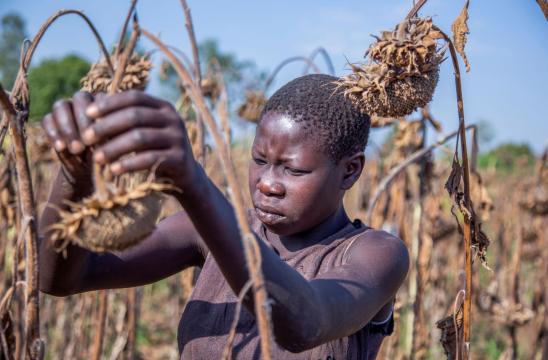
LWF Uganda implements a series of projects relating to food security and agriculture. These have led to a diversification in crops and vegetables grown, improving food security and nutrition.
LWF has worked with farmers to increase food production levels and food security by training them in modern agronomic practices, farming as a business, nutrition, post harvest handling, value addition and marketing. LWF also influences seed multiplication and the duplication of successful farming techniques by farmers which help in mitigating effects of climate change and also helps them cope with shocks at household level.
Access to clean, sufficient affordable water is a prerequisite for life and for achieving sustainable solutions to food insecurity. To increase access to water in a sustainable way, LWF's interventions include drilling and rehabilitation of wells/boreholes, motorizing water pumps and trucking water from surface water sources to water tanks installed in the settlements. Communities are involved in managing water points, forinstance, the Water User Committees which keep water points clean.
Hygiene and sanitation awareness meetings are conducted at community level to increase the acceptance of safe water practices, proper disposal of waste, latrine construction and consistent use of good hygiene practices. Hygiene promoters and village health teams inform communities about the health benefits of good hygiene practices.
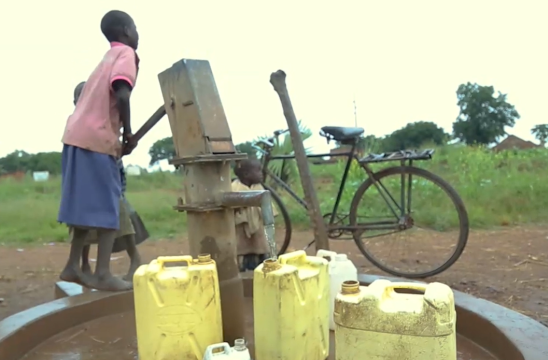
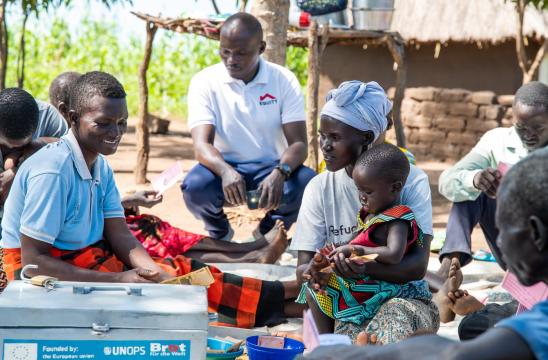
Village Savings and Loans Associations (VSLAs) as a sustainable livelihood mechanism is a successful practice across all LWF Uganda Projects. Women groups participating in income generating activities and credit schemes are our particular focus since evidence suggests that the success of such groups has a multiplier effect in the communities.
Overall, VSLAs act as a shock-absorber, and play a critical role in building self-reliance and reducing the dependency syndrome.
Climate change and unsustainable utilization of Natural Resources have increasingly undermined economic growth in Uganda. With the increasing need to promote environment sustainability in Uganda and ultimately contribute to SDG 7 (Access to energy for all) and 13 (combat climate change), LWF contributes to environmental conservation and restoration initiatives through promoting energy access for lighting and cooking in off-grid and bottom of the pyramid households. Moreover, LWF promotes tree growing and on-farm conservation of bio-energy resources and endangered tree species such as the Shea nut trees.
In the Humanitarian and Emergency context, LWF is promoting its initiatives in line with UNHCR’s global strategy to Safe Access to Fuel and Energy (SAFE) by implementing a holistic proactive approach aiming at promoting environmental peace and security among the refugees and other persons of concern. This is underpinned by the increasing recognition of access to energy as a humanitarian right essential for wellbeing, safety and productivity of crisis affected populations. Key interventions are focus on access to energy for cooking, lighting and powering; tree planting and conservation of indigenous trees through tree marking and regeneration.
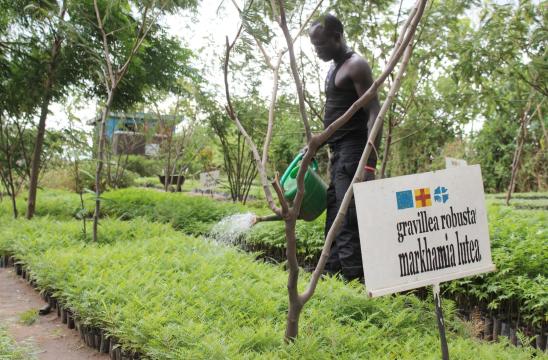
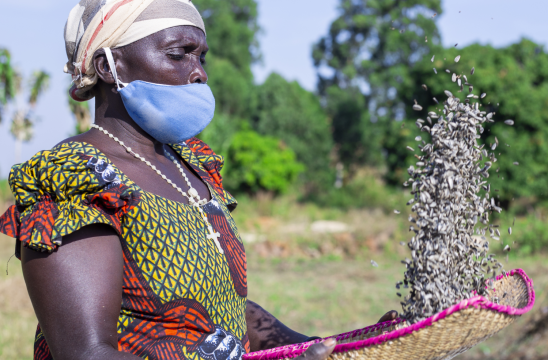
Our Disaster risk Reduction ( DRR) and emergency preparedness work aims at building resilient communities as well as reducing vulnerability. As part of this, LWF Uganda is active in strengthening the capacity of local actors, buliding their capacity to prepare for disasters in their contexts and environment.
We strengthen the functionality of DRR committees to plan and manage water logging and dry spells that occur at various levels, in line with the national policy guidelines. The DRR committees have been able to disseminate the disaster policy guidelines from the district to village level, contributing to an improvement in DRR planning, implementation and monitoring at all levels.
Emergency response is a strong thematic area in LWF Uganda's overall program. With support from ACTAlliance, LWF meets people's immediate needs in emergency zones in a timely manner. With LWF's swift and effective emergency response, it has managed to win the trust of partners like the Office of the Prime Minister (OPM) and UNHCR as well as funding organizations.
Currently, LWF supports South Sudanese and Congolese Refugees in the districts of Moyo, Lamwo, Adjumani and Kamwenge respectively. In refugee settlements, LWF extends aid in various sectors like; water, sanitation and hygiene (WASH); shelter/construction; community service (supports persons with special needs, provides psycho-social counselling, peace building, distribution of non-food items, et al); protection (to unaccompanied minors, legal protection for women children, as well as against gender based violence); and livelihoods.
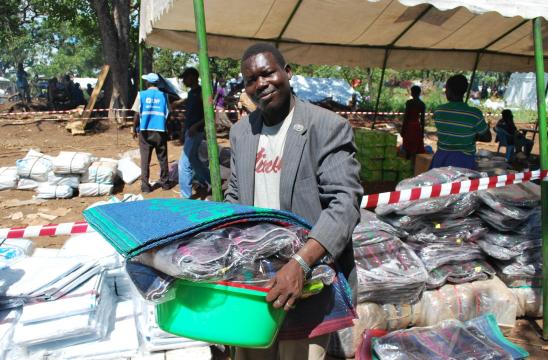
LWF is well positioned to advocate for vulnerable communities. LWF strengthens the capacity of communities to ensure that they effectively exercise their power to demand for their rights.
Communities are empowered to hold duty bearers accountable for service delivery. Other than that, LWF also focuses on ensuring peaceful co-existence within and across communities. Building the capacity of peaceful conflict resolution and management in communities remains one of LWF's priorities.
LWF's Protection Team coordinates protection response including; Gender-based Violence (GBV) and Child Protection with Legal Service and Psychosocial Support. The team aims at addressing both effective prevention as well as risk reduction strategies specific to GBV to increase direct service provision, promote a safer environment for girls, boys, women and men.
Using community based structures, existing GBV mechanisms are institutionalized, enhanced with good practices, which increases the programmatic reach of GBV interventions, especially with refugees.
LWF empowers the community through awareness raising and also strengthens the capacity of community based structures to effectively address GBV. Response interventions include; case management, Psychosocial and Legal support to survivors. LWF uses survivor-centred and rights-based approach in all GBV interventions.
The Child Protection Sub-Sector works to prevent and respond to violence, abuse and exploitation of boys and girls living in emergency zones / refugee settlements. LWF supports prioritization of child protection activities within the overall humanitarian response, by identifying unaccompanied children at Collection or Transit centres. Through Best Interest Assessments (BIA) and Best Interest Determinants (BID), the different needs of boys and girls at risk are recognised to inform predictable and effective responses aimed at stopping, preventing or alleviating the worst effects of conflict or abuse of children.
All protection interventions are also aimed at equal access to and enjoyment of rights by persons of concern, in accordance with the relevant bodies of law, including; international humanitarian, human rights and refugee law. Special attention is also given to specific rights of the elderly and persons with disabilities.


